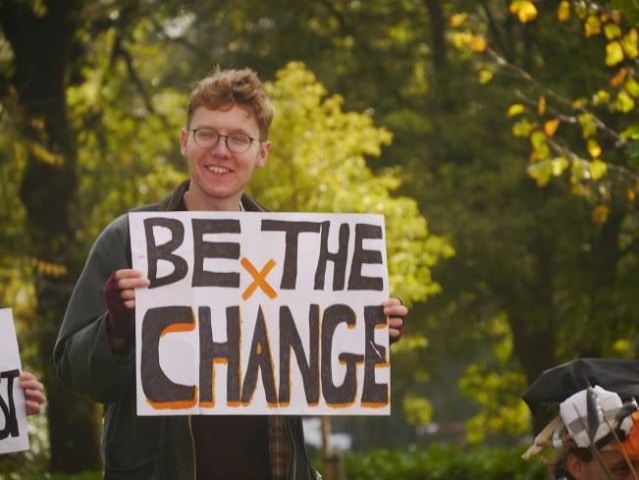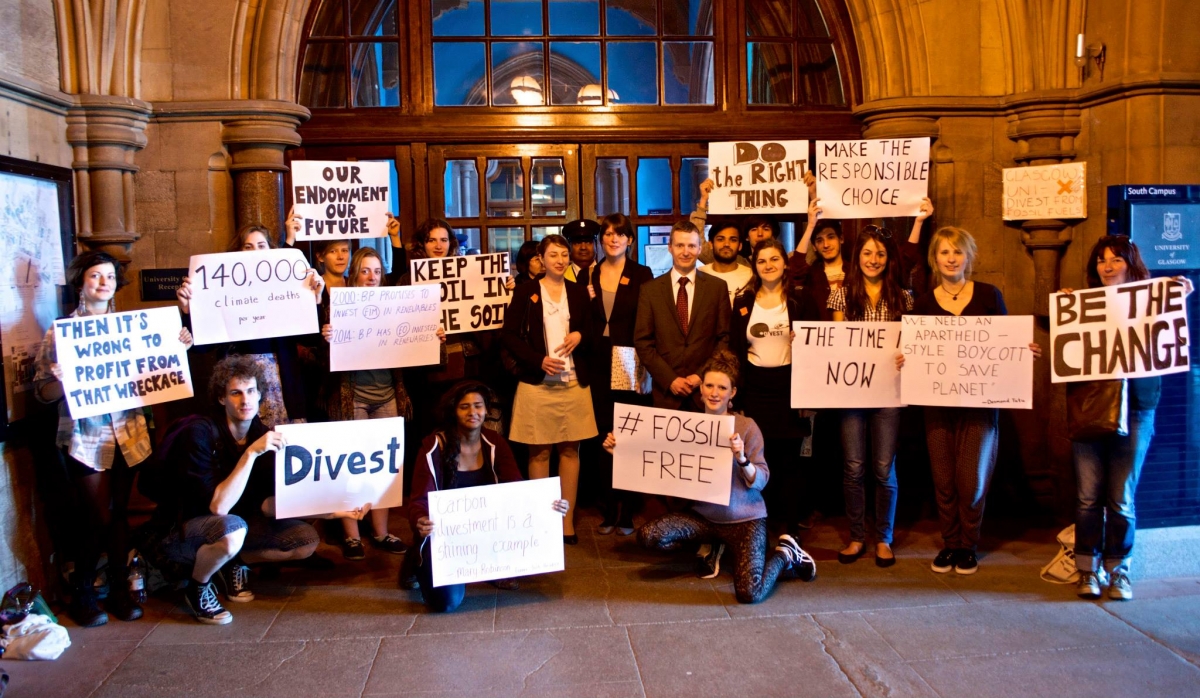The campaign for fossil fuel divestment doesn’t end once someone agrees to divest, Sophie Baumert, coordinator of the Glasgow University Climate Action Society, tells DeSmog UK.
Glasgow University was the first academic institution in Europe to announce it would divest from the fossil fuel industry over the next 10 years. Its landmark decision was heralded as “a dramatic beachhead for the divestment movement” by American environmentalist Bill McKibben and has inspired universities across Britain and Europe to follow suit.
But six months later, the university is still mulling the decision. It has yet to begin divesting its £18m-worth of fossil fuel investments in companies including Shell, BP, Chevron and Centrica.
You can’t “just sit back and enjoy the win,” warns Baumert, a third-year politics and philosophy student. “Even if the university says yes, it’s not over at this point … [You] need to monitor that the university is actually going through with the decision.”
Ethical Decision
The decision taken by Glasgow University last October was based on ethics, explains Baumert, who has been involved in the campaign since it began in April 2013.
Documents obtained by DeSmog UK under the Freedom of Information Act show that the assigned working group told the Court – the university’s governing body – that “it would be contrary to the University’s value systems to take no action on fossil fuel investment.”
And in the working group’s second report discussed at the Court on 30 September 2014, it was argued that if the “Court accepts the argument for divestment based on the University’s values, then it should agree to disinvest, even although [sic] this may involve reduced income in the short term.”
In the end, the Court’s final decision was subject to further examination of the financial impact of divestment. The university is now consulting financial advisors on whether or not fossil fuel divestment is possible.
Delayed Meeting
A meeting was expected last month where the university would evaluate the outcome from their financial managers; however, DeSmog UK has learned this has now been delayed until April.
Peter Aitchison, Director of Media and Public Relations at Glasgow University, told DeSmog UK: “This commitment was made subject to reassurance that the financial impact for the University is acceptable. We are expecting a sub-committee of the finance committee to report back to Court in late April.”
Student campaigners have also been asked to prepare their own financial report analysing whether fossil-free portfolios can perform as well as portfolios including fossil fuel companies.
“It took up a lot of time, because we’re not financial experts,” Baumert says. “We tried to collect as much evidence that this [the carbon bubble] was real and divestment could be done in a financially responsible way.”
“We tried to do that because their financial advisers seem to be a bit more conservative, so we are not sure whether they would advise the university that it actually can divest,” she explains.
Positive Feedback
The report was submitted last month. It analysed current research on the subject, including studies looking at fossil-free indexes over a 10-year period, as well as evidence on the carbon bubble, which posits that fossil fuel assets are overvalued since the majority can never be extracted if governments agree to meaningful action on climate change.
“[We have] already received positive feedback for it,” Baumert says, “it’s just a matter of the financial advisors finishing their evaluation now.”
It is unclear, however, whether analysing these financial reports is simply another step in the long divestment process or whether it represents a larger hurdle in convincing the university to divest.
“We’ve received mixed responses,” Baumert says. “The university agreed to divest over a period of 10 years at the amount of £18m, so personally I don’t see why there should be a big financial problem … 10 years, it’s such a long process it should be possible to do.”
“But because the financial managers are outside the university we can’t really contact them or talk to them, so we don’t know what’s going to happen,” she adds. “We hope that they’re going to make it happen!”
As the minutes from 8 October 2014 (when the final decision was made) show, “the conclusion of the Working Group had been that it supported the ethical case for disinvesting from the fossil fuel extraction industry, that it recognised this would involve a modest risk to the financial return on the University’s investments, and that it believed that this risk could be effectively managed by disinvesting over a substantial period of time.”
Learning From Mistakes
To help galvanise support, the Glasgow University Climate Action Society has collected 100 signatures from academics saying they support the decision to divest. Baumert hopes this will give their campaign “a bit more leverage” and strength against its critics.
“Seeing so many students being inspired by us and getting messages asking us for help, that was really great,” Baumert reflects. “There was really a big momentum, especially immediately after the first week.”
“[But] we had the problem that directly after the decision was made we thought the campaign was over, everything was great, but actually it wasn’t, so we lost lots of valuable time,” she admits.
The group now actively shares its experiences, be it through visiting other universities, answering emails or participating in Skype calls. “Beforehand, [during the campaign] we were prepared for everything but afterwards [challenges] came out of the blue,” she says. “I would give others the advice to be prepared for this.”
Photos via Glasgow University Climate Action Society
Subscribe to our newsletter
Stay up to date with DeSmog news and alerts








